Highlights
Many Wiki Education staff members attended WikiConference North America in Boston. Wikidata Program Manager Will Kent, Scholars & Scientists Program Manager Ryan McGrady, Wikipedia Student Program Manager Helaine Blumenthal, Senior Wikipedia Expert Ian Ramjohn, Director of Partnerships Jami Mathewson and Chief Technology Officer Sage Ross presented at the conference alongside many Wiki Education program participants and faculty instructors in our programs. Wiki Education won the Education Impact Award during the conference.
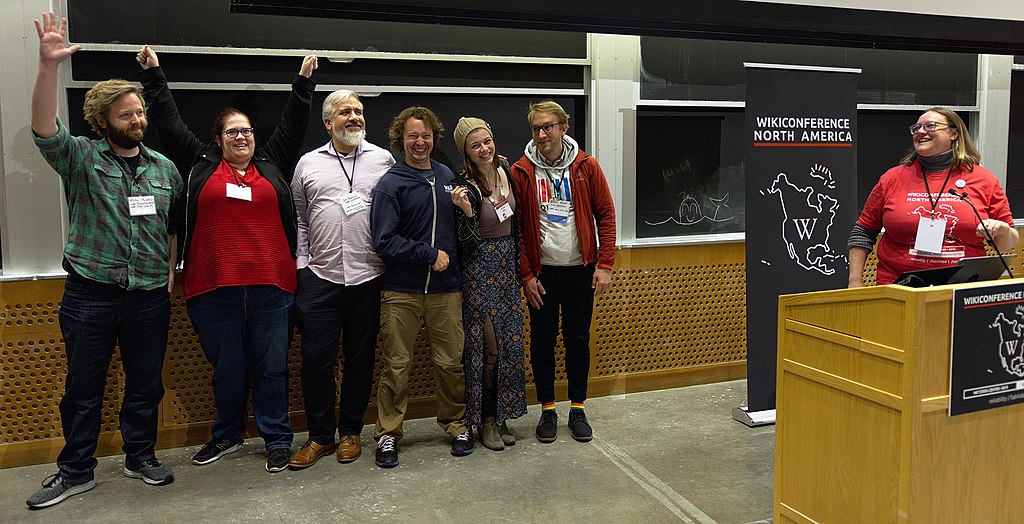
Image by Ruben Rodriguez, CC BY-SA 4.0 via Wikimedia Commons.
- November was a busy month for partnerships. Jami joined faculty at Western Colorado University to promote the use of Wikipedia as a teaching tool. While in Cambridge for WikiConference North America Jami had the opportunity to visit Harvard School of Public Health and Boston University and presented to instructors. Also, Jami and Customer Success Manager Samantha Weald attended the Women’s Forum Global Meeting to run a 3-day session teaching conference attendees about Wikipedia’s gender gap and how they can help curb it.
Programs
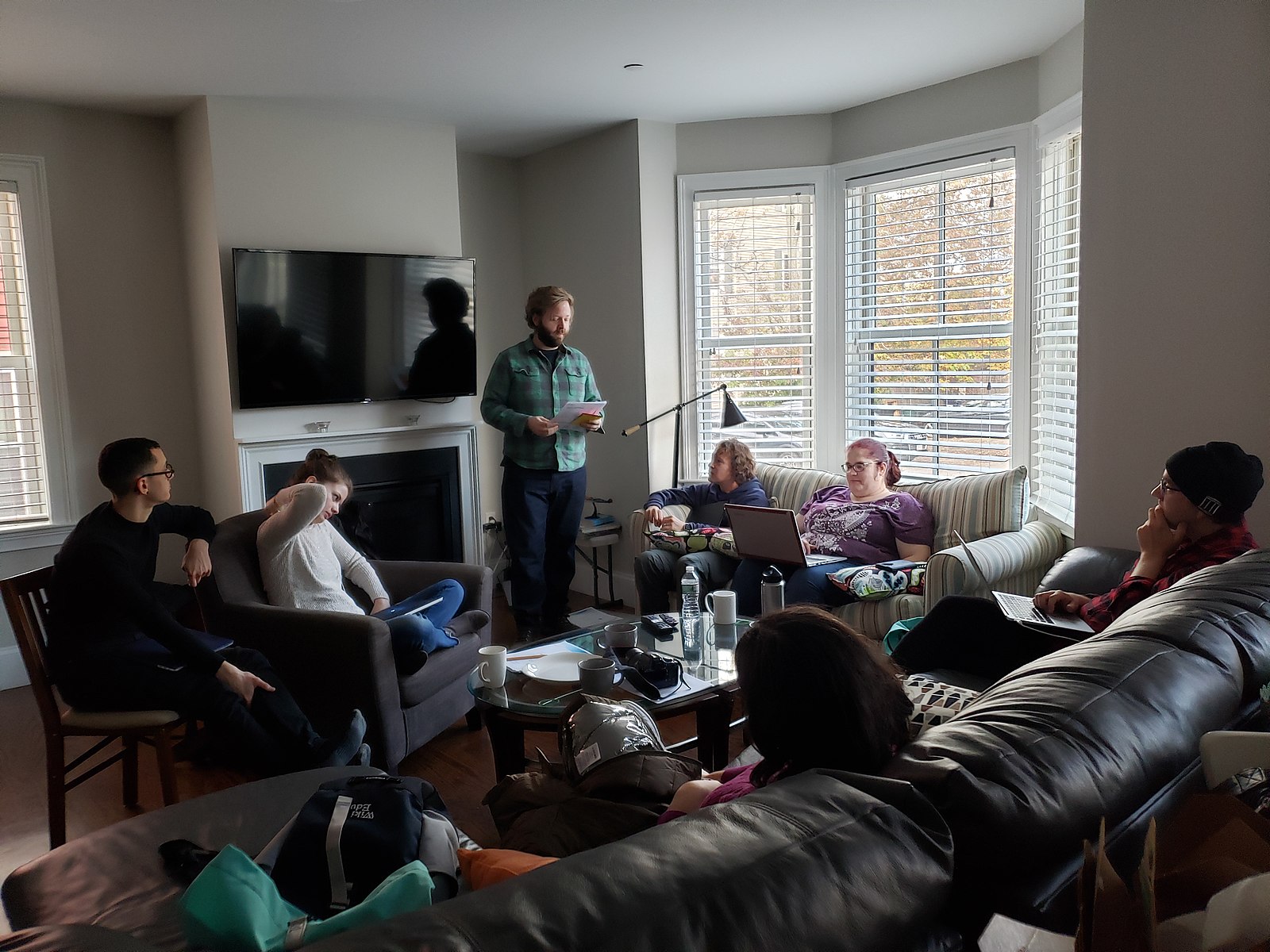
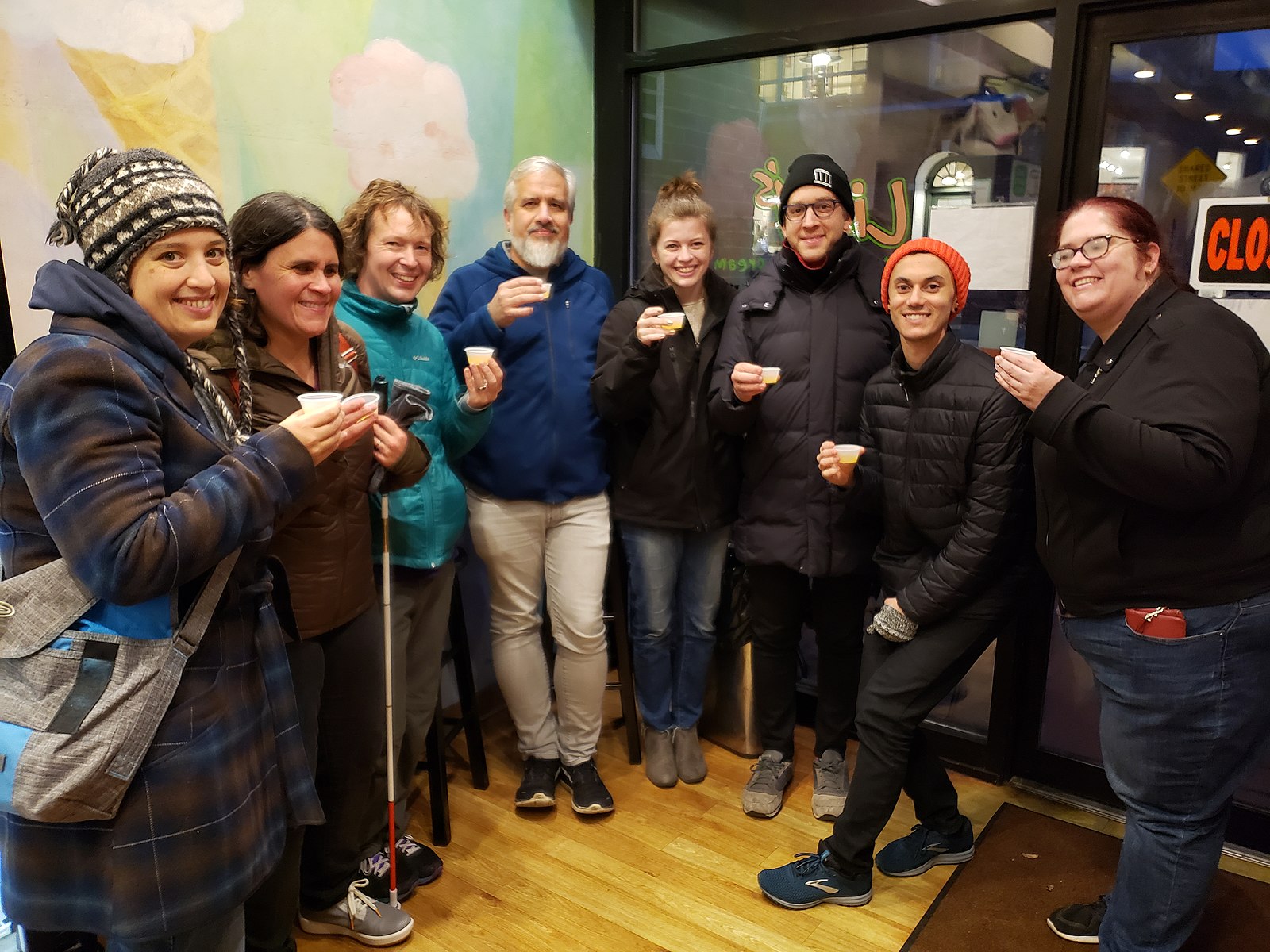
The Programs and Technology teams had a joint offsite meeting in Boston, Massachusetts, prior to WikiConference North America. Agenda items included an overview of the current fiscal year for both Programs and Tech, each program manager sharing survey results and what they’ve learned from their programs, learnings from professional development staff have taken recently, and a revisiting of our process maps. We also engaged in a team activity around our DISC profiles. After we wrapped up the meeting part of the day, we all did a walking tour of Harvard Square — focused on chocolate. We learned about the process of producing chocolate, and then tasted it in a variety of forms, from chocolate bars to cookies to ice cream to balsamic vinegar. The offsite was a great way to both share learnings and touch base on our work and engage in team-building activities.
Wikipedia Student Program
Status of the Wikipedia Student Program for Fall 2019 in numbers, as of November 30:
- 388 Wiki Education-supported courses were in progress (222, or 57%, were led by returning instructors)
- 7,451 student editors were enrolled
- 62% of students were up-to-date with their assigned training modules.
- Students edited 4,960 articles, created 417 new entries, added 3.61 million words and 37,600 references.
As always, November is one of the busiest months for the Student Program as students begin to move their work into the article main space. While our Wikipedia Experts were hard at work reviewing student work and responding to requests for help, Program Manager Helaine Blumenthal began to plan for the Spring 2020 term in earnest.
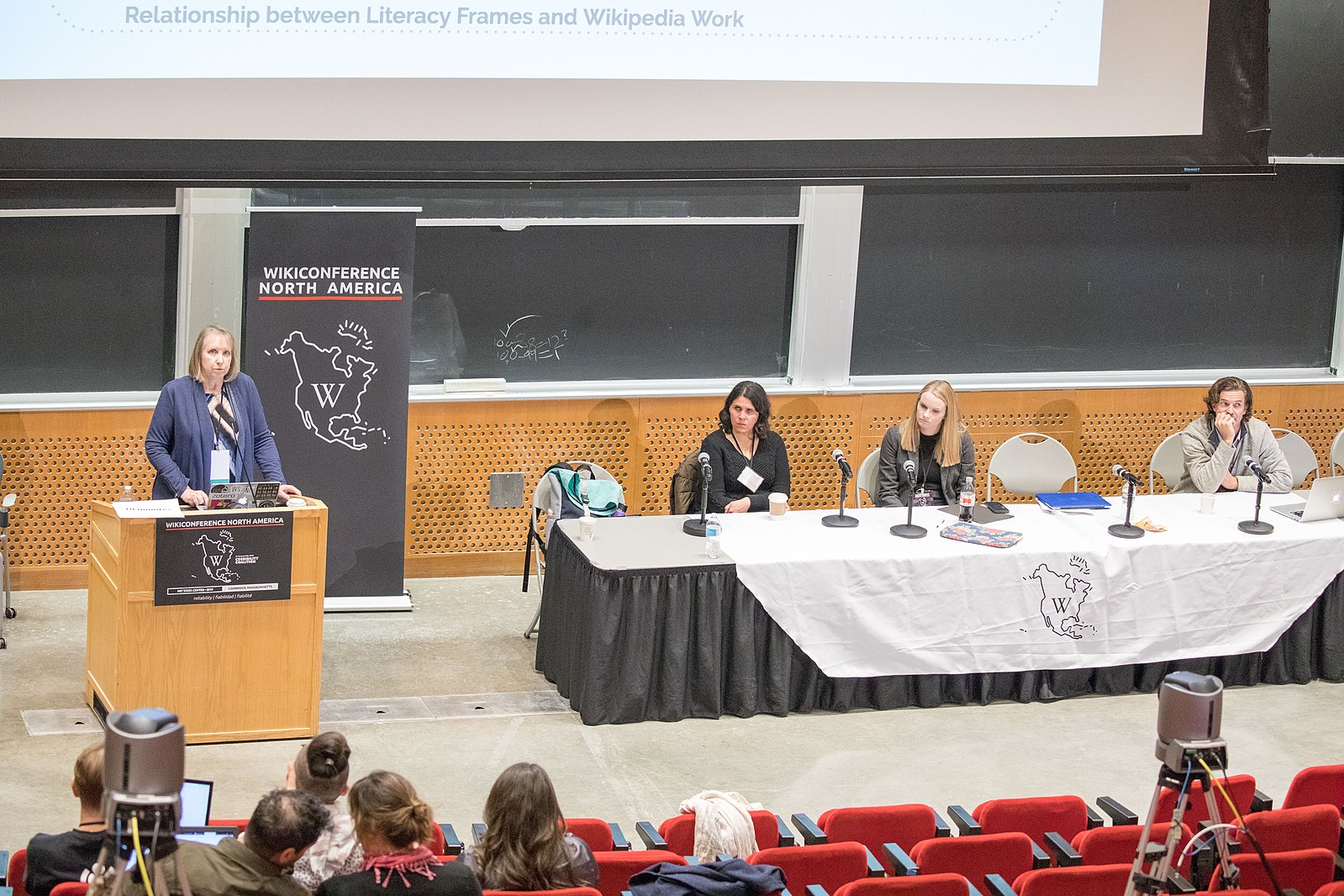
Image by Victor Grigas, CC BY-SA 4.0 via Wikimedia Commons.
Each term, Wiki Education works with hundreds of instructors, but we rarely get to meet our program participants in person. In November, we had two opportunities to do so. At this year’s WikiConference North America, held in Boston, Helaine got to both present along side several of our instructors as well as attend a number of presentations about how instructors are using Wikipedia in their classrooms. We also had a chance to meet up with several of our instructors at this year’s National Women’s Studies Association conference held right here in our home base of San Francisco. Helaine, along with Chief Programs Officer LiAnna Davis, met with a handful of instructors to learn more about what instructors have to say about the Wikipedia assignment and what we here at Wiki Education can do to make it a better experience for both students and instructors alike.
Student work highlights:
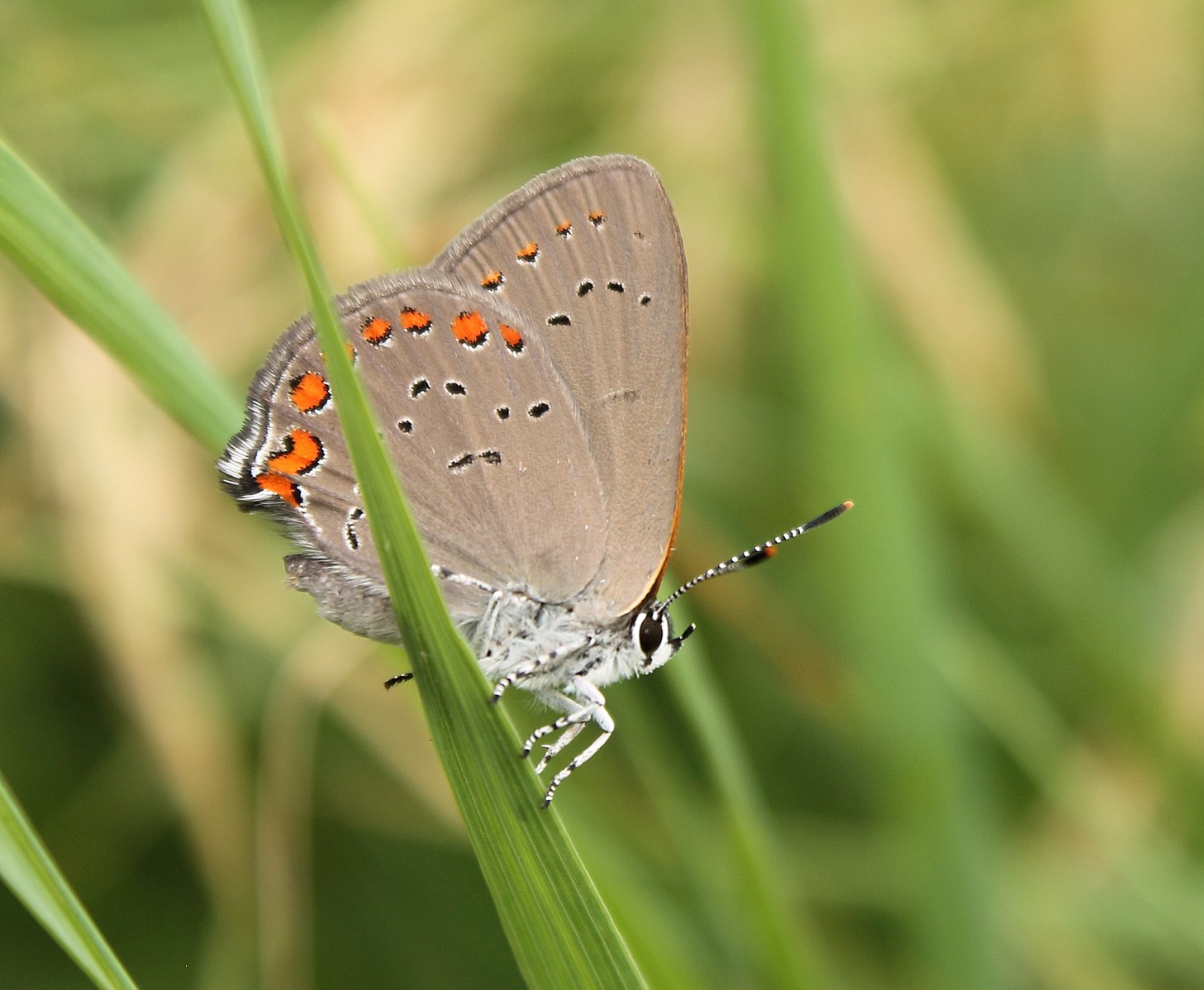
Image by Kopph, CC BY-SA 4.0 via Wikimedia Commons.
Literature has always been a great way to impart experiences and knowledge, as well as help people see things from an all new point of view. This is why Pearl Cleague’s debut novel What Looks Like Crazy on an Ordinary Day is so important, as one proponent of the book stated that it showcases the empowerment of women in the face of undeniably difficult life challenges and that Cleage’s focus on the challenges associated with AIDS, drug addiction, and domestic violence offers an intuitive look into the realities of social issues that are dealt with at surface level by traditional societal institutions. Shortly after its release at the end of December 1997 this book became part of the Oprah Winfrey Book Club and spent nine weeks on the New York Times Bestseller List. We can thank University of Florida instructor Delia Steverson, who taught her first class with us this fall, for the creation of this article, as one of the students in her Gender and Sexualities in African American Literature class chose to work on this remarkable novel.
Eugenics has a dark and dirty shadow that continues to haunt humanity. Given the atrocities that have been committed in the name of “better humans”, it is important to remember what has come before so we as a society can work towards preventing further harm. Vanderbilt University students in first time instructor Danielle Picard’s Eugenics and Its Shadow course worked on and created several articles, two of which are on the Race Betterment Foundation and the sculpture Average Young American Male. The Race Betterment Foundation was a eugenics and hygiene foundation founded in 1906 at Battle Creek, Michigan by John Harvey Kellogg (yes, the man behind the breakfast cereal) due to his concerns about race degeneracy. The foundation supported conferences, including three National Conferences on Race Betterment, publications (Good Health), and a eugenics registry in cooperation with the ERO (Eugenics Record Office). The foundation also sponsored the Fitter Families Campaign from 1928 to the late 1930s and funded Battle Creek College (not what is now Andrews University). The foundation controlled the Battle Creek Food Company, which in turn served as the major source for Kellogg’s eugenics programs, conferences, and Battle Creek College. The Average Young American Male was a 22-inch plaster statue sculpted in 1921 by Jane Davenport Harris as a composite model for the eugenics movement in the United States. The statue was exhibited at the Second and Third International Congresses of Eugenics in 1921 and 1932, respectively, as a visual representation of that which eugenicists considered to be the degeneration of the white race. While the statue received mixed responses from contemporary critics, it inspired the creation of additional composite statues as propaganda for the eugenics movement throughout the mid-twentieth century.
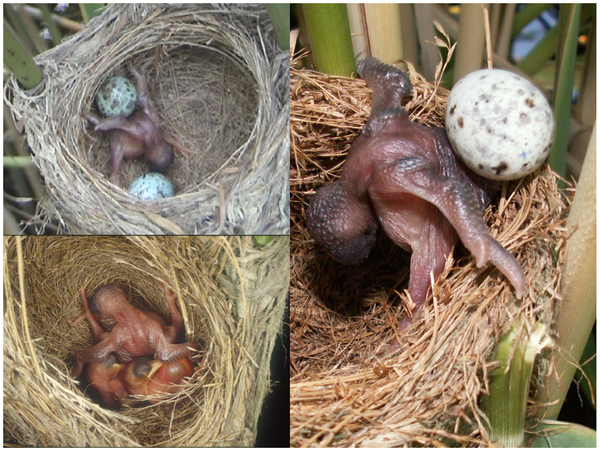
Memorial University of Newfoundland’s Animal Behaviour course.
Image by Anderson MG, CC BY 4.0 via Wikimedia Commons.
Human communication by talking is complex and sophisticated, though you’d be wrong to think we’re the only animals capable of complex communication! This term, David Wilson’s Animal Behaviour course out of Memorial University of Newfoundland explored the myriad ways that animals behave and communicate with each other. Students in the course were busy, editing 74 articles total, including 5 new creations. Cleaner fish, an article about fish that remove dead skin and parasites from other fish’s skin and gills, saw huge growth, with the student now responsible for almost 80% of the article. Another article that saw growth was egg tossing, an article about, as expected, when birds dump eggs from a nest. Though it may seem counterintuitive for birds to throw eggs from their own nests, they may have good reasons, including tossing eggs of competing birds of the same or different species. Some egg tossing is done by nest parasites like cuckoos, who remove eggs from the nest of a host bird to add their own. Cuckoo hatchlings will even knock the host birds’ eggs out of nests so that they get all the attention from parents. The students’ edits brought detail and sturdy referencing to a fascinating array of articles on animal behavior.
Bluegrass music is a genre of American roots music that developed in the 1940s in the United States Appalachian region. Countless musicians have performed in this genre, which include Reno and Smiley. They were an American musical duo that was composed of Don Reno (May 17, 1925 – October 16, 1984) and Red Smiley (February 21, 1925 – January 2, 1972). They were one of the most acclaimed duos in the country, now bluegrass, music in the 1950s and early 1960s. It’s thanks to East Tennessee State University students in Lee Bidgood’s Bluegrass History I class that this article has been expanded and improved.
Calypso Rose is an iconic Tobagonian calypsonian with a career spanning almost 65 years. At the age of 78 she was the age of 78 was the first calypsonian to perform at Coachella and the oldest person ever to do so. Students in Kavita Singh’s Caribbean Literatures course rewrote most of the article, greatly improving Wikipedia’s coverage of an important artist from the Caribbean. Beryl Gilroy is a Guyanese teacher and novelist who has been called “one of Britain’s most significant post-war Caribbean migrants”. A student editor in the class substantially improved Gilroy’s Wikipedia biography, adding content and context to her career and achievements. Other student editors in the class made major improvements to the biographies of Rita Indiana, a writer and singer-songwriter from the Dominican Republic, and Patrick Chamoiseau, a writer from Martinique. Another student editor added information about the indentureship process to the Chinese Caribbeans article.
You’d probably expect that more complex organisms have more genes that very simple ones, but the reality is that there’s no relationship between the complexity and the number of genes — humans have about the same number of genes as a nematode, while the water flea, Daphnia pulex, has more than 60% more. This state of affairs is known as the G-value paradox. The article was created by a student editor in Dan Graur’s Advanced Ecology and Evolution class. Another student in the class worked on the broader Genome size article, adding to it a discussion of the concept of genome miniaturization. One student in the class created new articles about the enemy release hypothesis, which suggests that the reason invasive species succeed in that they have escaped from the pests, predators and pathogens that normally keep them in check, while another created the herbivore effectives on plant diversity article.
Most ant species produce winged reproductives (alates) which emerge from the nest in large swarms and mate. The females then go and found new colonies, while the males die. But for about 55 species of ants, the reproductives are wingless like the workers, and are called ergatoids. Before a student from this class started working on it, Wikipedia’s ergatoid article was short — four sentences long — and quite hard for the average reader to make sense of. Thanks to a student editor, this article is now lengthy, fairly comprehensive and, maybe most importantly, it’s readable and informative to someone who may never have heard the term before.
Two student-authored articles appeared on Wikipedia’s Main Page in the Did You Know? section, Leptoconops torrens on November 21, and Syritta pipiens on November 22.
Scholars & Scientists Program
WikiConference North America
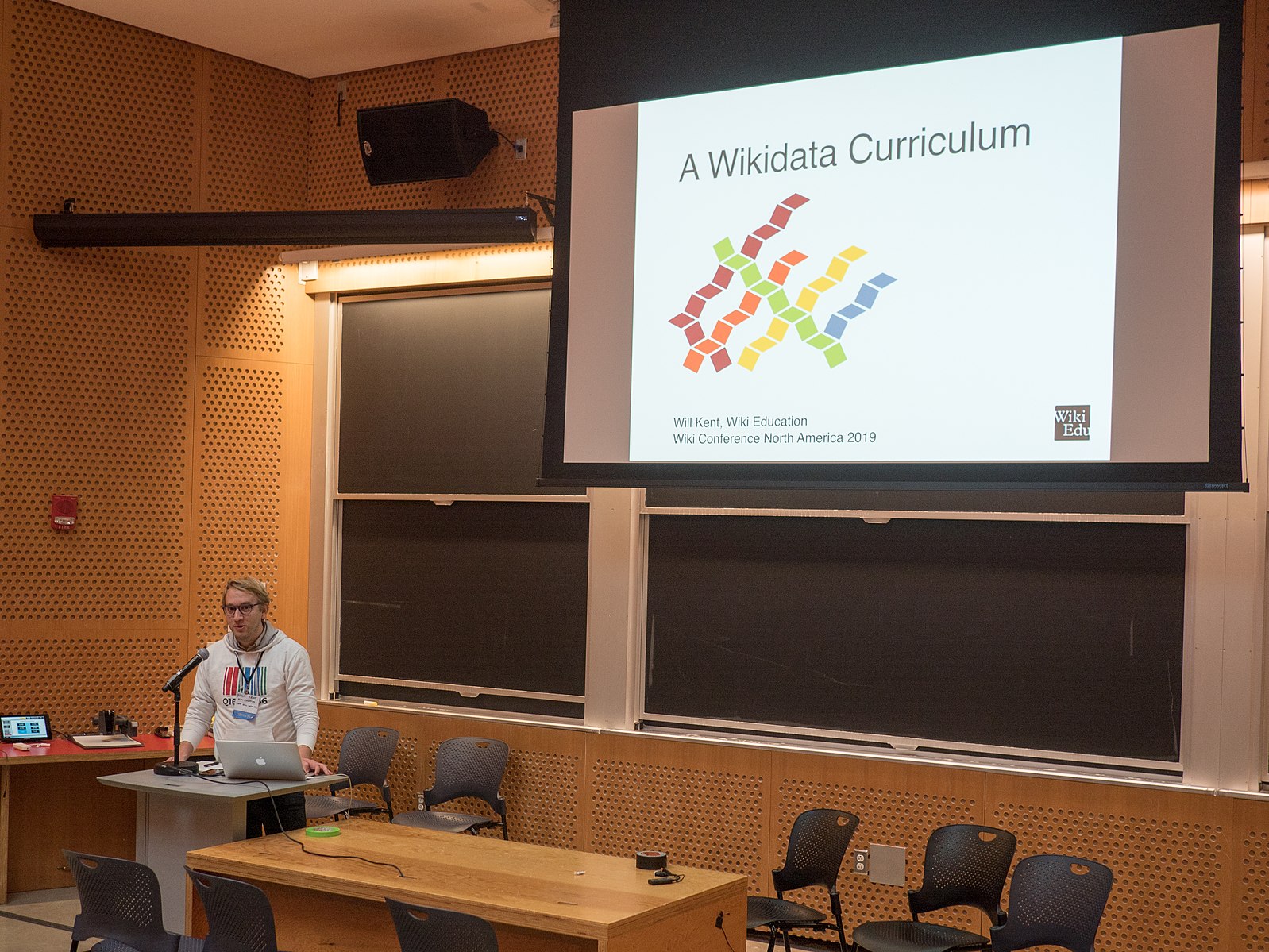
November saw many Wiki Education staff attend WikiConference North America in Boston. Wikidata Program Manager Will Kent and Scholars & Scientists Program Manager Ryan McGrady joined Helaine to talk about how Wiki Education’s programs engage subject-matter experts in different ways. The question of how to encourage people with advanced knowledge to edit Wikipedia is one that comes up regularly at Wikipedia-related conferences, and one that Ryan and other Wiki Education staff have even presented on there in the past. What excited us this time was to present about programs that are actually doing that. Ryan explained the idea behind the Scholars & Scientists program, how it overcomes several of the well-documented obstacles to subject-matter expert engagement, the model of support we use, and some of the successes we have seen in the nearly two years the program has been running. Will addressed ways in which seeking subject specialists differs with Wikidata than Wikipedia. He explained why expertise is helpful in standardizing Wikidata’s ontology, seeking consistency across items, and identifying gaps on Wikidata that non-specialists may miss. Click through the above link to see a description, notes, and a link to the recording of this session.
Will also presented about building a Wikidata curriculum. This session framed Will’s curriculum development process around the new Wikidata courses. Specifically the session addressed some of the challenges around developing a Wikidata curriculum including, what to include/exclude, how to make it approachable, how to make it relatable, how to measure understanding, and how to construct assignments that make sense for the participants. This session also generated a dynamic question and answer session allowing for participants to share their thoughts on curriculum development. The intention of the session was to encourage others to pursue creating their own version of a Wikidata curriculum. Judging from the question and answer session, many hurdles remain, but there are many manageable ways of training others to use Wikidata. The above link also contains a description, notes, and a link to the session recording.
Director of Partnerships Jami Mathewson joined Judy Davidson, Sara Marks, and June Lemen from the University of Massachusetts Lowell to talk about their Women in Red at UMass Lowell initiative, fostering digital literacy among students and faculty while also improving Wikipedia’s coverage of notable women from the region. Judy, Sara, and June have coordinated and participated in a Wiki Scholars course with us that is ongoing and shared their experience in that effort. See below for highlights from that course.
Wikidata
Our two Wikidata courses continued through the month of November, one intermediate and one beginner. We have a record number of participants taking these courses. These two courses have only a week left and will wrap up at the beginning of December. So far everyone is off to a great start, asking some excellent questions, participating in sessions, and editing Wikidata. Here are some details:
- Beginner: This course has 18 editors who have also made more than 100 edits. They are also excelling at adding references to statements. This course has a healthy mix of participants with linked data experience and some without as much Wikidata experience. Nevertheless conversations have gravitated toward some of the most specific details of Wikidata — property usage, data consistency, how to learn about using tools, and specific query requests.
- Intermediate: There are 11 editors who have already made more than 100 edits across 100 items. These editors are also adding references to statements. As an intermediate course, several of these course participants have experience with linked data. They also have some ideas for projects that would involve integrating Wikidata into their workflows at their respective institutions. Conversations in this course revolve around these project ideas, answering questions about Wikidata specifics.
As with other Wikidata courses, participants have a diverse set of needs and expectations of Wikidata. Both courses are already exploring several use cases that speak to library and museum needs. We have had conversations about using Wikidata to connect identifiers, propose properties, interact with the Wikidata community, and pull specific data sets from Wikidata through queries.
One conversation revolved around the tool, genetic tree, which reveals taxonomic relationships between items. This had an impact on the course participant to further their understanding of how queries work and how they might model data from their collection.
Wikipedia
We had three Wikipedia Scholars & Scientists courses active this month. First, we were excited to launch a new course, Living Knowledge, focused on improving biology-related articles on Wikipedia. At the end of the month, the course was only a couple weeks in, so they are still learning the basics of editing and selecting topics, but with their diverse specializations, we are looking forward to the improvements this group makes to science content on Wikipedia.
The Women in Red at UMass Lowell Wiki Scholars course hit its stride this month, with participants doing most of their article writing before the holiday break. Here are some of the highlights so far:
- A new article about Georgina Kleege, an American writer and professor at the University of California, Berkeley, who has written important work in disability studies.
- The article about Lowell State College, a historic precursor to UMass Lowell, has more than doubled in size.
- The Betsey Guppy Chamberlain article, about the 19th century textile mill worker and writer, also doubled in length.
- A significant expansion to the article about Sherley Anne Williams (1944–1999), a poet, novelist, professor, vocalist, jazz poet, playwright, and social critic.
Finally, the course we offered with the National Science Policy Network wrapped up this month. This was an exciting course in which participants focused on science topics about which the public needs high-quality information in order to understand the world around them (not to mention policy-makers themselves, who use Wikipedia, too). Here are some of the highlights from the course:
- The embryo article is a good example of the sort of big scientific topic that can easily be neglected on Wikipedia. Its scope is broad and it really benefits from the work of someone who comes to it with a broad understanding of the subject and the literature. One of the NSPN Wiki Scientists made major improvements to the page, correcting an overemphasis on human embryos (for which there is a separate article), expanding the article, rewriting the lead, and adding references.
- Water resource policy concerns one of our most fundamental resources and how it can be collected, prepared, used, and disposed of, taking into account human use and the environment. The incredibly important topic has had maintenance tags at the top of the article for several years, indicating it needed a lot of work. After this Wiki Scientists course, it is vastly improved, with new or rewritten/expanded sections, better organization, and more sources. It stands as a good example both of why these courses are so important — the great work subject-matter experts do, and why we need to keep bringing people in to continue the work.
- A new article about Jean Dickey (1945–2018), a pioneering geodesist (someone who works to measure and understand Earth’s shape, orientation, and gravitational field) and particle physicist who worked at NASA’s Jet Propulsion Laboratory for 37 years.
- Another new article on the National Alzheimer’s Project Act, which led to the U.S. National Alzheimer’s Plan to increase spending on research, care, and public engagement regarding the disease.
- Several improvements to agriculture in California, including adding information about the use of water and environmental effects.
- The Nuclear Posture Review concerns the role of nuclear weapons in U.S. security strategy. Until this course, it only included coverage of the reviews conducted in 2002 and 2010. But there were two others, in 1994 and 2018. With the addition of these sections, the article helps readers gain a clearer picture of the development of national policy on one of the most serious topics imaginable.
- Directly related is the Comprehensive Nuclear-Test Ban Treaty, for which a Wiki Scientist overhauled and expanded the section on monitoring.
- Pathogen, a broad subject covering anything that can produce disease. We included this article in last month’s monthly report, too, but as a Wiki Scientist continued to improve it, this 1,000-views-a-day article deserves mention again.
Visiting Scholars Program
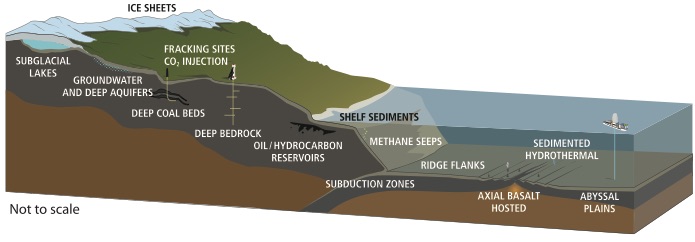
The biosphere is the sum of all ecosystems on Earth. Most of the life on Earth that we tend to think of exist above the surface, but the deep biosphere, the part of the biosphere below the first few meters of the surface, accounts for 15% of biomass on the planet, and about 90% of archaea and bacteria in particular. It extends at least 5 km below the surface, and 10.5 km below the sea surface. Organisms that live there exist at temperatures that can exceed 100 degrees C. The way organisms eat and breathe at these depths are quite different from the way we do on the surface, with metabolisms up to a million times slower. The fascinating, extensive, and accessible article was promoted to Good Article this month, thanks to the hard work of Andrew Newell, Visiting Scholar with the Deep Carbon Observatory.
Northeastern University Visiting Scholar Rosie Stephenson-Goodknight added two biographies of impressive women writers, both of whom got started early in life. Emma Huntington Nason (1845–1921) was a poet, author, and composer from New England who started writing when she was only 12. Mary Bassett Clarke (1831–1908) was a writer from New York who published using the pen name Ida Fairfield starting from the age of 15.
Advancement
Fundraising
November was a slow month for fundraising. No new grants were awarded and no new proposals or concept notes were invited or submitted to funders. Some donations came in during the month from some individual supporters, especially on #GivingTuesday. In particular, we received a $1000 donation from Diana Strassman, a former member and chair of Wiki Education’s Board of Directors, and her husband Jeff.
The majority of our fundraising efforts in November were research and report related. We worked on drafting interim reports for our grants from the 20MM Michelson Foundation and from the Moore Foundation, which are due in December and January, respectively. We also continued to identify and qualify potential funders, including migrating our research and interaction notes to the software platform Asana. This software allows us to more easily see where each potential and existing funder is on a cultivation continuum.
Partnerships
This month, Director of Partnerships Jami Mathewson joined faculty at Western Colorado University to promote the use of Wikipedia as a teaching tool. Thanks to Director of Library Services Dustin Fife for bringing us out to campus. During the visit, Jami had the chance to speak with faculty interested in open educational resources (OER) the opportunity to learn about how students can engage with OER, turning it into an open educational practice. We look forward to bringing more Western Colorado faculty into the Student Program in the coming terms!
Jami attended WikiConference North America with several other Wiki Education staff members. She presented alongside faculty from the University of Massachusetts Lowell about the partnership we built this year to embed Wikipedia expertise on the UMass Lowell campus. We’re excited to share this project with other Wikipedians and university faculty, as we hope to run similar Wiki Scholars courses in partnership with other cohorts of campus faculty.
While in Cambridge for WikiCon North America, Jami had the opportunity to join Thais Morata and John Sadowski at the Harvard School of Public Health and Boston University. We presented to instructors about the work John and Thais are undertaking at NIOSH to improve Wikipedia’s coverage of occupational safety and health, including the great work they do as a part of Wiki Education’s Student Program. We enjoyed working with Diana Ceballos to coordinate these presentations and to showcase the excellent work her students have done on Wikipedia.
At the end of the month, Jami and Customer Success Manager Samantha Weald attended the Women’s Forum Global Meeting to run a 3-day session teaching conference attendees about Wikipedia’s gender gap and how they can help curb it. We were invited by Wikipedian Jess Wade, who has been an advocate for adding women’s biographies to Wikipedia over the past few years. We were thrilled to welcome Daria Cybulska of Wikimedia UK, Adelaide Calais and Amélie Cabon of Wikimedia UK, and Natacha Rault of Les sans pagEs to help raise visibility of the work we can do to bring more women to Wikipedia.
Communications
As 2019 comes to a close, we’re beginning to reflect on all the great progress that program participants have made on Wikipedia this year. Namely, several of the instructors we support won teaching awards for their Wikipedia assignments. Read more about that in our blog from this month.
We featured a guest blog by one of the instructors we support: Melony Shemberger, who has also taken one of our Wikipedia training courses, provides a framework for teaching Wikipedia writing assignments in the journalism classroom. Read more!
We also featured a story from one of our Wikipedia training courses for Society of Family Planning members. The participant shares their experience improving Wikipedia pages about family planning in Uganda, where they are from. Read more!
For those who are curious about how our Wikipedia training courses come about, check out our case studies with two partners: the Colorado Alliance of Research Libraries and the Society of Family Planning. Both organizations sponsored courses for their members, who produced some great work on Wikipedia.
Blog posts:
- Ugandans writing their own story of family planning (November 1)
- Monthly Report, September 2019 (November 1)
- Channeling passion into action: NSPN Wiki Scientists (November 5)
- Who’s interested in learning to use Wikidata? (November 12)
- Learning and sharing at WikiConference North America (November 20)
- Meeting your patients where they are: on Wikipedia (November 21)
- How the Colorado Alliance of Research Libraries ensures librarians across the state are “Wikipedia literate” (November 26)
- Turning a composition course into public scholarship (November 27)
External media:
- Channeling passion into action: NSPN Wiki Scientists. Ryan McGrady. Republishing on the National Science Policy Network blog. (November 22)
Technology
In November, we polished up and extended the Dashboard updates to the student user experience that will roll out in late December. In addition to students’ assigned articles and peer reviews, the Dashboard will allow students to register completion of assigned exercises such as the ‘evaluate an article’ task that typically occurs near the beginning of a course.
We also improved how the Dashboard handles the automatic posting of templates to students’ userpages and talk pages, so that when such an edit fails we can still ensure that the template gets posted later.
Our newest pair of Outreachy interns were announced this month as well — with projects that will be co-mentored by two of our interns from the summer! Lalitha Reddy, co-mentored by summer intern Khyati Soneji, will be rewriting the Dashboard’s Campaign page system, laying the groundwork for a better user experience and easier maintenance in the long term. Glory Agatevure, co-mentored by summer intern Ujjwal Agrawal, will carry forward the Dashboard Android app that Ujjwal began earlier this year. This set of internships begins in early December and goes through March.
Finance & Administration
The total expenditures for the month of November were $202K, +$31K over the budget of $171K. The biggest contributor to the difference was timing. Fundraising was over by $2K, all was travel, budgeted for the prior month. General Administration was over by +$15K, of which +$2K were indirect expenses no longer being reallocated, +$8K in meetings and +$6K in travel, both budgeted for prior month, while underspending in location expenses ($2K). Programs were over $14K, underspending in Indirect Costs($2K) and Communications ($2K), while being over in Outside Contract Services +$13K and vacation accruals +$5K due to the implementation of an updated PTO policy.
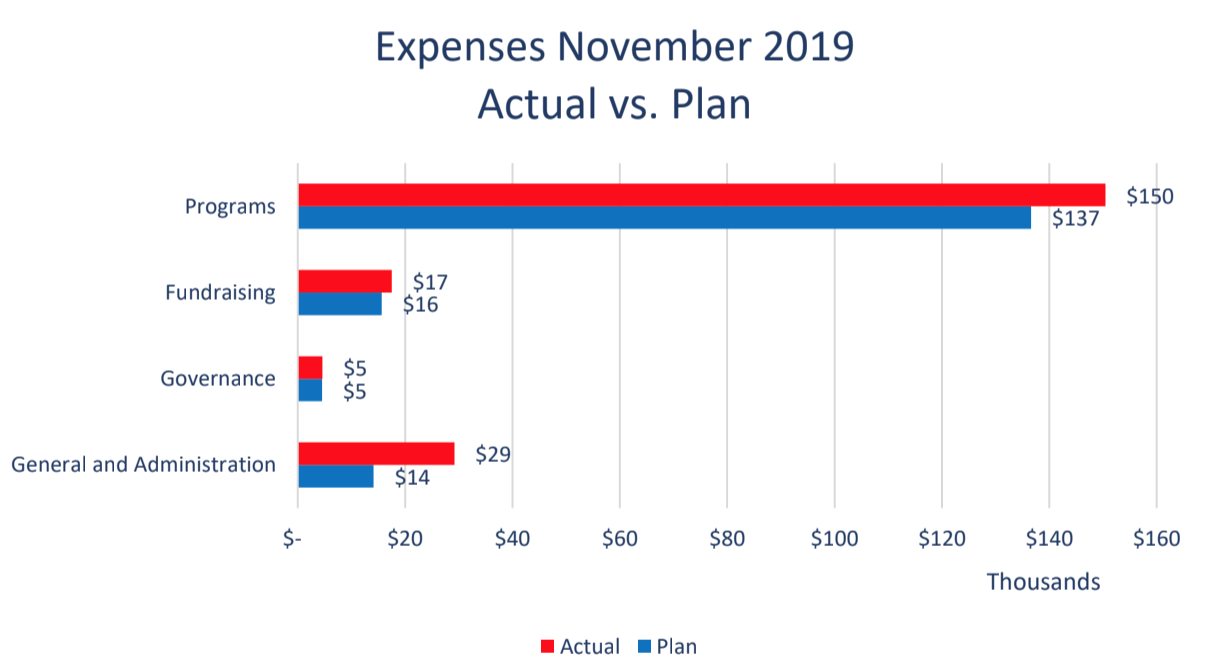
The Year-to-date expenses are $895K, ($36K) under the budget of $931K. Fundraising is under by ($3K), of which ($2K) is Indirect costs and ($1K) is under in Travel. General and Administration is over by +$45K. +$62K in Indirect costs not re-allocated to Programs and Fundraising, +$6K in Travel, and +$2K in Communications, while underspending ($16K) in Professional Services, (3K) Location Expenses and ($6K) in general expenses. Programs is under ($78K), of which ($60K) relates to Indirect costs, ($10K) in communications, ($28K) Travel while over in Payroll Expenses +$9K, and Outside Services +$13K.
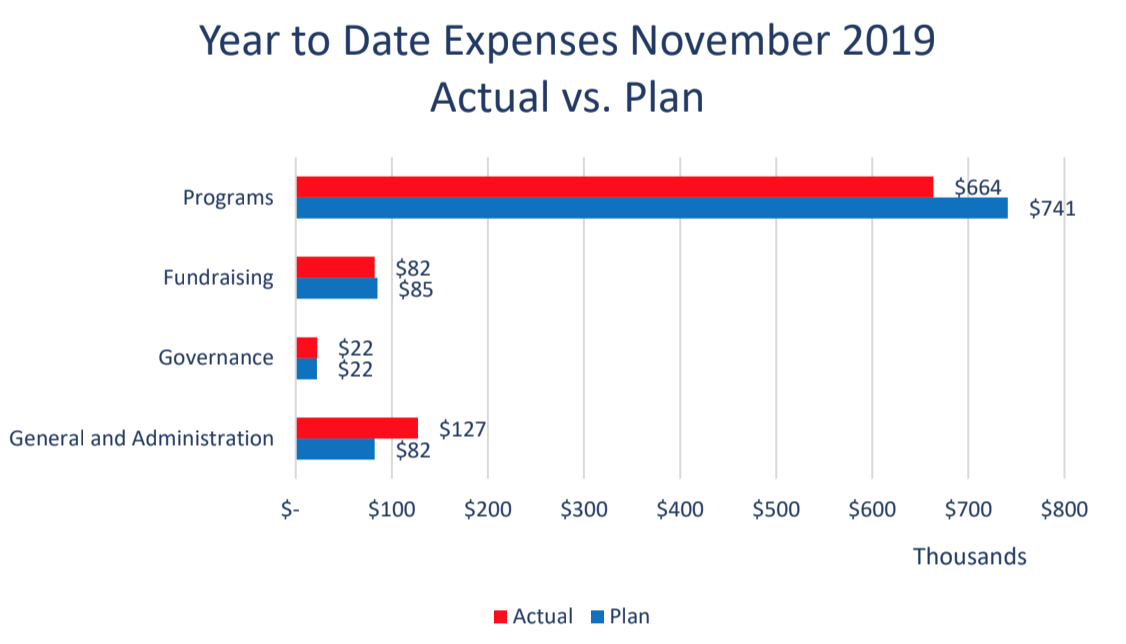
Office of the ED
Current priorities:
- High-level analysis of Wiki Education’s work in the area of institutional fundraising
- Finalizing the audit for fiscal year 2018–19
- Supporting the board’s recruitment of new board members
In November, Frank attended WikiConference North America in Boston alongside a number of staff members. The main conference took place at the Massachusetts Institute of Technology’s Stata Center on the MIT campus. Organized by a team of volunteer Wikimedians from all over North America, this year’s conference focused on credibility and reliability in news and media. The four-day event proved to be an excellent opportunity for Wiki Education’s staff to present some results of their own work, to learn about the work of others, to engage in face-to-face conversations with members of the community, and also to meet with local funding prospects and partners.
In October, Frank had initiated a high-level conversation about the future of Wiki Education’s institutional fundraising. This work continued in November with TJ, LiAnna and Frank working on a “fundraising outlook” document. Although we’ve been very successful with creating an additional revenue stream through earned income, institutional fundraising will continue playing a very important role for Wiki Education in the years to come. Given the significance of this part of our revenue model, Frank felt like it was time to perform a high-level analysis that will guide our institutional fundraising work going forward. Over the course of several small group meetings, TJ, LiAnna and Frank discussed Wiki Education’s opportunities and challenges with regard to institutional fundraising, as well as solutions that will improve our fundraising outlook going forward. The results will serve as a basis of discussion with the board in its upcoming in-person meeting in early 2020.
Also in November, Frank talked to Susan Malone from our external auditing firm Hood & Strong and answered all her questions about fiscal year 2018–19 as part of our yearly financial audit process. SFBay Financials, supported by Ozge and Andres, provided extensive documentation as requested by the auditors. We’re currently clearly ahead of last year’s schedule and expect the audit to be finished before the end of the year.
